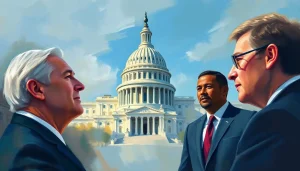Money and power intertwine on Capitol Hill, where the average lawmaker’s net worth towers nearly ten times higher than that of the typical American household they represent. This stark contrast between the financial status of elected officials and their constituents raises questions about representation, influence, and the very nature of American democracy. As we delve into the complexities of Congress wealth, we’ll uncover the intricate web of financial dynamics that shape our nation’s legislative branch.
The Golden Halls of Congress: A Wealth Wonderland
When we talk about “Congress wealth,” we’re not just referring to the opulent chambers where laws are made. It’s about the personal fortunes of those who occupy those seats. Understanding the financial backgrounds of our legislators is crucial because it provides insight into their potential motivations, biases, and the economic lens through which they view policy decisions.
Historically, wealth has always played a role in American politics. From the Founding Fathers, many of whom were wealthy landowners, to the robber barons of the Gilded Age who wielded significant political influence, money and power have long been bedfellows in the halls of government. But today’s Congress takes this relationship to new heights, with many members boasting net worths that would make even the most successful entrepreneurs blush.
Show Me the Money: The Current State of Congressional Coffers
Let’s talk numbers, shall we? The average net worth of a member of Congress is estimated to be around $1 million. Now, before you start planning your campaign run, remember that this figure is heavily skewed by some extremely wealthy outliers. Still, it’s a far cry from the median American household net worth of about $121,700.
But wait, there’s more! This wealth isn’t evenly distributed across the political spectrum. While both parties have their fair share of millionaires, some studies suggest that Republicans in Congress tend to be slightly wealthier on average than their Democratic counterparts. However, it’s important to note that wealth by state varies significantly, which can influence the financial profiles of representatives from different regions.
Some members of Congress take the concept of “public servant” to a whole new tax bracket. Take, for example, Senator Mitt Romney, whose net worth is estimated to be north of $250 million. Or Representative Darrell Issa, whose fortune from his car alarm business places him among the wealthiest members of Congress. These financial heavyweights are not anomalies but rather the tip of a very affluent iceberg.
The Golden Goose: Where Does All This Money Come From?
Now, you might be wondering how our elected officials amass such impressive fortunes. Well, it’s not all from their government salaries, that’s for sure. Many members of Congress come into office with pre-existing wealth, often from successful business ventures or family inheritances. Take a look at the wealth of top 10 percent in US, and you’ll find that many Congress members fit comfortably within this elite group.
Investments and stock portfolios play a significant role in building and maintaining congressional wealth. Some lawmakers have faced scrutiny for their stock trading activities, particularly when these trades coincide with legislative decisions that could affect the companies in question. It’s a delicate dance between personal finance and public trust, and not everyone manages to keep their toes unstepped.
But wait, there’s more! Book deals and speaking engagements can be incredibly lucrative for high-profile politicians. A well-timed memoir or a series of speeches can pad a lawmaker’s bank account quite nicely. And let’s not forget about the revolving door between Congress and the private sector. The promise of lucrative post-congressional career opportunities can be a powerful motivator for some legislators.
Money Talks: The Impact of Wealth on Legislative Decisions
Now, here’s where things get really interesting. How does all this wealth influence the way our laws are made? It’s a question that keeps political scientists, ethicists, and concerned citizens up at night.
Potential conflicts of interest are the elephants (and donkeys) in the room. When a lawmaker has significant investments in a particular industry, how can we be sure their legislative decisions aren’t influenced by personal financial interests? It’s a thorny issue that goes to the heart of representative democracy.
Studies have shown correlations between legislators’ wealth and their voting patterns on economic issues. For instance, wealthier members of Congress are more likely to vote for policies that benefit high-income earners. This trend raises questions about the democratization of wealth and whether our current system truly represents the interests of all Americans.
The relationship between wealth and campaign financing is another crucial piece of the puzzle. Wealthy candidates can often self-fund their campaigns, giving them a significant advantage in elections. This dynamic can create barriers for less affluent candidates and potentially limit the diversity of economic backgrounds represented in Congress.
Public perception of wealthy legislators is a mixed bag. While some voters admire the business acumen and success of their representatives, others view extreme wealth as a sign of being out of touch with the average American’s struggles. This perception can influence electoral outcomes and shape public trust in government institutions.
Rules of the Game: Regulations and Transparency Measures
Given the potential for conflicts of interest, you might be wondering what rules are in place to keep our wealthy lawmakers in check. Well, there are some, but whether they’re enough is a matter of heated debate.
Financial disclosure requirements are the first line of defense. Members of Congress are required to file annual reports detailing their income, assets, and liabilities. These reports are meant to provide transparency and allow the public to identify potential conflicts of interest. However, critics argue that these disclosures often lack detail and can be difficult for the average citizen to interpret.
Ethics rules regarding personal investments have been tightened in recent years, particularly in response to high-profile scandals involving insider trading. The STOCK Act of 2012, for instance, explicitly prohibits members of Congress from using non-public information for personal financial gain. But enforcing these rules and closing loopholes remains an ongoing challenge.
There have been numerous proposals to address potential conflicts of interest more comprehensively. These range from requiring lawmakers to place their assets in blind trusts to outright bans on stock trading for members of Congress and their families. However, implementing stricter regulations faces significant hurdles, not least from the very lawmakers who would be affected by them.
The Wealth Gap: Implications for Democracy
The concentration of wealth in Congress raises profound questions about the nature of representation in our democracy. When the financial realities of lawmakers are so far removed from those of their constituents, can they truly understand and advocate for the needs of average Americans?
This wealth disparity can create significant barriers to entry for less affluent candidates. Running for Congress is an expensive endeavor, and without personal wealth or access to wealthy donors, many potential candidates find themselves priced out of the political arena. This dynamic potentially limits the diversity of voices and experiences represented in our legislative branch.
The impact on public trust and confidence in government cannot be overstated. When citizens perceive their representatives as part of a wealthy elite, it can breed cynicism and disengagement from the political process. This erosion of trust threatens the very foundations of democratic governance.
Balancing financial success and public service is a tightrope walk. While we shouldn’t discourage successful individuals from entering public service, we must also ensure that our legislative body represents a broad spectrum of economic experiences and perspectives.
A Tale of Two Americas: The AOC Effect
In the midst of this sea of wealth, there are notable exceptions that capture the public imagination. Take, for instance, the case of Alexandria Ocasio-Cortez, better known as AOC. The AOC wealth story is a stark contrast to many of her colleagues. Entering Congress with student loan debt and a working-class background, AOC has become a symbol of a different kind of representation.
Her presence in Congress highlights the potential for change and the importance of diverse economic backgrounds in our legislative body. It also underscores the challenges faced by less affluent representatives in a system that often seems tailored to the wealthy.
From the Capitol to the White House: A Wealth of Power
The concentration of wealth in Congress is mirrored, and often amplified, in the executive branch. A look at presidents by wealth reveals a fascinating pattern of affluence at the highest levels of government. From the land-rich founders to modern-day business tycoons turned politicians, the presidency has often been occupied by individuals of considerable means.
This trend raises similar questions about representation and influence at the executive level. How does a president’s personal wealth shape their policy priorities and decision-making? The answers to these questions have far-reaching implications for the direction of our nation.
The Big Picture: Wealth’s Role in Modern Politics
As we step back and examine the broader landscape, it becomes clear that wealth’s role in modern politics is both pervasive and complex. From campaign financing to lobbying efforts, from policy priorities to public perception, money flows through every aspect of our political system.
This reality has sparked intense debate about potential reforms. Proposals like the Warren wealth tax aim to address wealth inequality at a systemic level, with implications that would reach far beyond the halls of Congress. These discussions force us to grapple with fundamental questions about fairness, opportunity, and the very nature of our economic system.
The Bottom Line: A Call for Informed Engagement
As we conclude our journey through the gilded halls of Congress, it’s clear that the relationship between wealth and political power in America is as complex as it is consequential. The concentration of wealth among our legislators raises important questions about representation, influence, and the health of our democracy.
But it’s not all doom and gloom. Increased transparency, growing public awareness, and the emergence of candidates from diverse economic backgrounds offer hope for a more representative future. The key lies in informed civic engagement. By understanding the financial dynamics at play in our political system, we can make more informed choices at the ballot box and hold our representatives accountable.
As we look to the future, the wealth dynamics in Congress will undoubtedly continue to evolve. Will we see a greater diversity of economic backgrounds represented? Will new regulations change the financial landscape for lawmakers? Only time will tell. But one thing is certain: in a nation where the total wealth of the United States is so vast, ensuring that this wealth is represented fairly and used responsibly in our political system will remain a critical challenge for generations to come.
In the end, it’s up to us, the citizens, to stay informed, engaged, and committed to the principles of representative democracy. After all, in a government of the people, by the people, and for the people, the true wealth of our nation lies not in the bank accounts of our legislators, but in the power of an engaged and informed citizenry.
References:
1. Center for Responsive Politics. (2021). “Personal Finances.” OpenSecrets.org.
2. Peterson-Withorn, C. (2019). “The Net Worth Of Every 2020 Presidential Candidate.” Forbes.
3. Carnes, N. (2018). “The Cash Ceiling: Why Only the Rich Run for Office–and What We Can Do about It.” Princeton University Press.
4. Eggers, A. C., & Hainmueller, J. (2013). “Capitol Losses: The Mediocre Performance of Congressional Stock Portfolios.” The Journal of Politics, 75(2), 535-551.
5. Curry, J. M., & Lee, F. E. (2019). “Non-Party Government: Bipartisan Lawmaking and Party Power in Congress.” Perspectives on Politics, 17(1), 47-65.
6. Drutman, L. (2020). “Breaking the Two-Party Doom Loop: The Case for Multiparty Democracy in America.” Oxford University Press.
7. Makse, T. (2019). “Expertise and the Dynamics of Legislative Cosponsorship Networks.” American Politics Research, 47(4), 731-754.
8. Hertel-Fernandez, A., Mildenberger, M., & Stokes, L. C. (2019). “Legislative Staff and Representation in Congress.” American Political Science Review, 113(1), 1-18.












Would you like to add any comments? (optional)